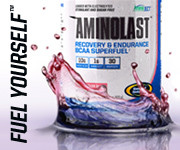In Texas an experienced female athlete was competing in a triathlon when she became dehydrated during the run. During the first mile she had diarrhea and quad cramps. By mile six she had stopped sweating and a severe headache came upon her. She eventually finished the race but became delirious. When she tried to rehydrate she began vomiting and could not take in any fluids. She was rushed to the hospital for an IV and additional treatment. While in the hospital she experienced wide spread muscle breakdown, electrolyte imbalance, and her lungs filled with fluid. She ended up being placed on life support with a 50% chance of living. Thankfully she recovered, but dehydration is clearly something to be taken very seriously. Our bodies use a very sophisticated cooling system to maintain their proper temperature. When we use our muscles while grappling, one of the byproducts is heat. This heat needs to be removed by the body somehow. The primary way that we do that is by evaporating sweat from our skin. When the sweat evaporates, it creates a cooling effect.
Our bodies use a very sophisticated cooling system to maintain their proper temperature. When we use our muscles while grappling, one of the byproducts is heat. This heat needs to be removed by the body somehow. The primary way that we do that is by evaporating sweat from our skin. When the sweat evaporates, it creates a cooling effect.
Many times in BJJ we train in rooms that are very humid. This is caused by everyone sweating in a confined space, and the air very quickly becomes saturated with water vapor. When we are in this humid environment, the sweat doesn’t evaporate from our body, it simply pools up and drips off. The sweat that drips off doesn’t have a powerful cooling effect, and so our bodies are forced to sweat even more to try and make up for it. This inefficient cooling process makes us lose additional water, as well as important salt. Training in the gi can make the problem even worse, although once the gi is wet it can promote some cooling.
Minor dehydration occurs when you have lost only a few percent of your bodies water volume. For a 180lb man, this might be 34oz of water, which you can easily lose in about 30 minutes of heavy grappling. The symptoms of minor dehydration include thirst, cotton mouth, fatigue, weakness, and head rushes.
Severe dehydration starts when you lose more than 5% of your bodies water volume. This equates to approximately 86oz of water for a 180lb man. It would take a little more than an hour of heavy grappling (assuming proper hydration when starting) to lose this much water through sweating. Effects of severe dehydration include increased heart rate, decreased sweating, increased body temperature, extreme fatigue, cramping, headaches, nausea, and tingling of limbs.
If you body reaches 10% loss of water volume, you should seek immediate medical attention because you might not be able to rehydrate yourself and you are at risk of permanently damaging your body. At this point, even death is a possibility. Symptoms for this level of dehydration include vomiting, muscle spasms, racing pulse, shriveled skin, dim vision, confusion, and seizures.
To avoid getting dehydrated, it is important to drink plenty of fluid both before, during, and after training. Your body can only absorb about 27oz of water per hour, while it can lose more than 60oz per hour. This means that you need to hyper-hydrate your body before you get to class. Drink between 12 and 20 oz of fluid about an hour before training. During training, drink at least 20oz of water/hour. And drink another 20oz-30oz after training.
You can drink plain water, or a sports drink of some kind. Sports drinks usually contain additional salts, which help to replace the salt lost through sweating, but this is more important for exercises lasting for long periods of time like triathlons. For a typical Jiu-Jitsu training session plain water is fine for keeping hydrated. Avoid drinks with more than 10% sugar, as they tend to be more difficult absorb. It is also important to avoid drinks with lots of caffeine as this can accelerate fluid loss.
Dehydration is a serious medical condition that can cause lots of problems, even death in severe cases. But it is easily avoided by simply being aware of how much you sweat, and making sure to replace lost fluid by drinking enough water.
BJJ HEALTH & FITNESS
blog comments powered by Disqus





